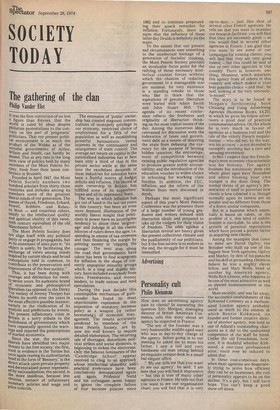Personality cult
.Philio Kleinman
How does an advertising agency gain its clients? In answering the question Eric Morgan, managing director of British American Cosmetics, tells this story about an agency he inspected in France: 'The son of the founder was a very businesslike middle-aged man who was in day-to-day charge of the agency. Before going in to our meeting he asked me to meet his father. I saw a tall and very handsome old man sitting behind an exquisite antique desk in a small but elegant office.
"'My son tells me that you want to see our agency', he said; 'I am sure that you will find it impressive — but this is true of many other agencies in France. He tells me that you want to see our organisation chart; you will find that it is very up-to-date — just like that of several other French agencies. He tells me that you want to examine our research facilities; you will find that they are extremely good — as you would find in several other agencies in France. I am glad that you want to see some of our campaigns for existing clients; you will find that they are very good indeed — but this could be said of one or two other agencies in this country. There is, however, one thing, Monsieur, which separates this agency from all others in this country and which makes it your best possible choice — and that', he said, looking at me very seriously, is myself.' "
The story is to be found in Morgan's forthcoming book Choosing and Using Advertising Agencies (Business Books, £4.25), in which he gives his fellow advertisers a good deal of practical commonsense advice. On the whole he is very much in favour of agencies as a business tool and the tale of the elderly French megalomaniac — who did not, by the way, win his account — is not intended to exemplify anything but a rare and amusing eccentricty.
In fact I suspect that the Frenchman's most eccentric characteristic was his honesty. The agency business has notoriously been one where giant egos have flourished and where blowing your own trumpet is the done thing. The normal theme of an agency's presentation of itself to potential new clients is how talented it is, though normally again its talents are no greater and no different from those of a dozen similar companies.
But in a business which essentially is based on talent, or the promise of it, this kind of exhibitionism is inevitable. So also is the growth of personal reputations which have proved a potent factor in acquiring new clients.
Among the examples that come to mind are David Ogilvy, the Britisher who built up one of the. biggest New York agencies, Ogilvy and Mather, by dint of his panache and his skill at persuading clients to believe he was a mighty clever fellow, and Mary Wells, head of another big American agency, Wells Rich Greene, who happens to be one of the most attractive as well as shrewd businesswomen in the world.
More recently, and less far away, the successful establishment of the Kirkwood Company as a medium sized London agency probably owed as much to the esteem in which Ronnie Kirkwood, its founder and former creative director of another agency, was held as one of Adland's outstanding char acters as it did to the undoubted competence of the staff he hired.
Unlike the old Frenchman, however, it is doubtful whether Kirkwood, a one-time professional actor, could ever be induced to admit that.
In these cost-conscious days, when most agencies are desperately trying to prove how efficient they can be as businesses, the cult of personality appears to be on the decline. It's a pity, but I still have hope. You can't keep a good show-off down.


































 Previous page
Previous page